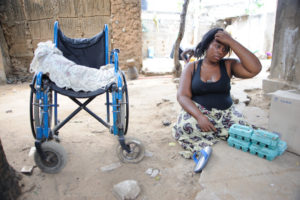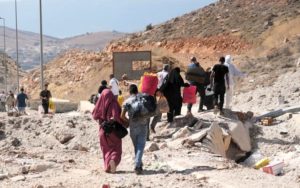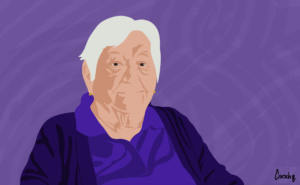The plight of civilians in the northwestern Syrian province of Idlib became too much to ignore in the middle of 2019 hot summer, even in a world that had become flooded and numbed by mediatised suffering.
In late August, U.N. humanitarian chief Mark Lowcock told the Security Council that nearly 600,000 people were displaced while “more than 500 civilians had been killed and many hundreds more injured” in this province. The WHO and UNICEF reported that “43 health facilities, 87 educational facilities, 29 water stations, and 7 markets have all been impacted by fighting since April.” These attacks have been confirmed “using tried and tested systems, whereby the UN receives reports from partners on the ground and reviews them against at least two other independent sources.”
The increasing and systematic aerial bombardment of medical and other civilian facilities in Idlib has shown how little respect or credibility the Russian and Syrian military give to de-confliction agreements they themselves negotiated and accepted. Even worse, and more alarming, though not surprising, there is a well-founded suspicion that information provided by the UN to the Russians to build a no-strike list, thus ensuring the safety of these facilities, was just used as a hit list.
In conversations held after some of these facilities were bombed, Russian liaison officers, I am told, dismissed the concerns of their humanitarian counterparts. In at least one such conversation, a Russian official told a humanitarian worker that “yes, we did bomb that place, it is treating terrorist.” Publicly, Russia described such claims as a “lie” while Syrian officials have reportedly claimed that such targeted health care facilities were taken over by terrorists who used them for other purposes. Obviously, these are well-trained diplomats, who know their countries signed the Geneva Conventions and would like to claim compliance, unlike the more frank and blunt liaison officer.
All in all, according to Physicians for Human Rights, 90% of corroborated 583 separate attacks on 350 medical facilities in Syria from March 2011 through May 2019 were traced to the Syrian government or its allies. These attacks killed 912 medical personnel.
Russian and Syrian officials, in their scornful public reaction and assertive background briefings, first dismissed all these ‘allegations’ of premeditated targeting of medical facilities as ‘fake news’. But, in essence, they dramatically expand the concepts of military advantage and proportionality present in IHL when dealing with ‘collateral’ civilian damage to justify killing civilians and hitting non-military installations. In this they have great masters in the Israeli Defense Force repeated bombings in Gaza and Lebanon (Qana is a case that comes to mind here).
As reports by human rights groups and pressure by western countries that oppose the Russian and Syrian military strategies and tactics increased, the UN bureaucracy had to act. In mid-September, the UN Secretary General decided to appoint a three-member Board of Inquiry (BoI) led by Nigerian Lt. General Chikadibia Obiakor to investigate the attacks against civilian targets in this last opposition-controlled area of the war-devastated Syria.
Without a formal endorsement of the Security Council (where Russia has long blocked almost all meaningful resolutions on Syria) it is very doubtful that such a board could be allowed into the country to conduct a thorough investigation, nor would it receive the cooperation of the pertinent authorities (namely, the Syrian and Russian ministries of defense!). This is why the UN announced that this BoI would not assign blame and its findings will remain internal.
Sometimes such defanged bodies, structurally unable to produce any conclusive findings, nor court-adequate material, enable the alleged aggressors to claim that ‘even international investigations proved nothing’! However, if this BoI only outcome is a UN-sanctioned list of aerially bombarded civilian facilities, especially those on the de-confliction list, in Idlib, this will be useful in possibly discouraging such behaviour in the future. Though they seem impossible to embarrass, reputational damage still matters to the Russian, while the ‘truth’ and using it in various way still matters to many actors in the human rights and humanitarian field.
There is a psychological as well as a strategic value to such investigations.
All of us are exposed to an endless stream of images of mass murder and bottomless anguish from ubiquitous screens wherever we turn our eyes (in the street, in public transport, at home, on our ‘smart’ phones, etc.). Most of these scenes and the few accompanying lines we may read or hear makes such horrible events remain inexplicable, though most of them can indeed be better interpreted or investigated if one has the time, stamina and motives.
Making such horrors “meaningful” rather than just “arbitrary” acts of ‘uncivilised’ and deranged dictators or states, is one major step towards regaining a sense of inhabiting our world and influencing it rather than the spreading state of being haunted by fear and impotence.
The ceaseless Russian and Syrian regime bombing of Idlib, 20% of whose population had to flee in the past six months, is a tragic example of this state of affairs. Exposing and resisting such actions as illegal, immoral and even counterproductive, is a duty that we all should bear. It is also a legal obligation for all world states under International Humanitarian Law (all of them have signed the Geneva Conventions whose first and common article calls on all signatories to “respect and to ensure respect for the present Convention in all circumstances”.)
Such inquiries and their reports are important in the struggle to uphold the ideals and rules enshrined in IHL while exposing its shortcomings in implementation and compliance. Laws are codes that keep on changing under shifting political, economic and social pressures. Laws can be exploited as tools of imposed order and aggression but they can also serve as a refuge for the weaker and for ensuring a measure of accountability.
This is why we should still push for investigations by international bodies and we should continue to expose violations of laws on how wars and conflicts should be conducted. Through these ostensibly Sisyphean struggles, we simply reform the laws, make them better, more enforceable or, at worst, bring down the façade that aggressive states and groups hypocritically insist on hiding behind.
Complex and multiparty conflicts in Syria and Yemen call for such an approach and this is why the UN decision to appoint a board of inquiry into events in Idlib in the past few months should be welcomed and exploited in various ways.
Photo credit: ©ICRC











